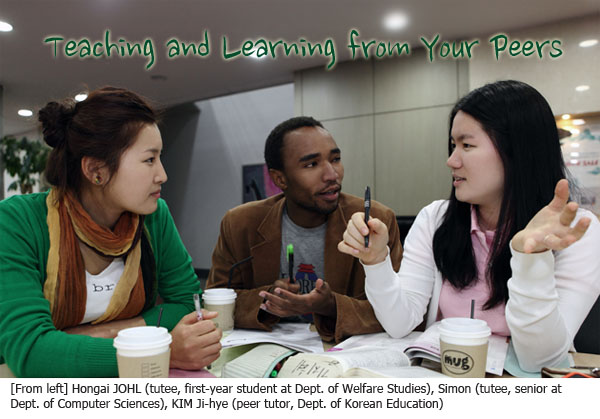
Faculty of Liberal Education Launched 'Peer Tutoring' Program
HONGAL JOHL (Department of Social Welfare, aged 21), a first-year student from Mongolia is reading a thick Korean textbook word by word. Because her Korean is not very fluent, her book is covered with vocabulary notes. How can she read such difficult books with her awkward Korean?
"I've never seen her give up. She finds all the words in her dictionary and always finishes reading her course materials. She has even written a five page report after reading her textbooks,” Hongal Johl’s peer tutor JI-HYE KIM (Department of Korean Education, 4th year) says proudly.
Hongal Johl and Kim met through a tutoring program at SNU that started just this semester. The program, the 'Peer-to-Peer Tutoring Program' for Korean and English was developed by the Faculty of Liberal Education as part of its SDE (Student Directed Education) program. Many first-year students face very different classes and subjects compared to high school and often feel frustrated at having to adjust to a different way of studying.
The 'Peer-to-Peer Tutoring Program' was proposed in order to help these students. Junior and senior students with high grades in 'College Korean' and 'Advanced English' classes are selected as Korean and English tutors and assigned two first-year students who need help in following 'College Korean' or 'College English' classes. As the name of the program implies, peers can teach and learn from each other. Already, the Department of Natural Sciences in SNU has begun offering peer-tutoring classes for calculus, physics, chemistry and biology as one credit courses in order to meet the needs of students who need help in their compulsory science classes. Similar programs have been set up and are running successfully at other universities.
The Korean tutoring program is targeted towards foreign students who are not familiar with the Korean language. They can receive lessons from peer tutors to help them in their 'College Korean' class and practice reading and speaking in Korean with their tutors. Also, since the tutees are not familiar with the Korean language and culture, they can practice reading Korean novels, poetry and newspapers or watch Korean movies with their tutors.
Hongal Johl had difficulty at first expressing her thoughts clearly in Korean. During the tutoring sessions with her tutor Kim, she practiced speaking in Korean. When she got stuck on a Korean word, her peer-tutor suggested some words she could use and their meanings. When they found just the right word, they exclaimed in delight and continued speaking animatedly."When I studied Korean alone, I could only rely on my Korean language classes and communication in Korean was one-sided. After participating in the peer tutoring program, I feel that my Korean is improving much faster through communication with my Korean friend," Hongal Johl says.
Such a tutoring program is beneficial not only to tutees but also to the tutors. Through this program, tutors and tutees can build up close friendships, and receive help from each other. Tutees can get help with the general courses in which they are experiencing difficulties, and tutors can have the opportunity to share their knowledge with others. Kim emphasizes that by participating in the program as a tutor, she is learning a valuable lesson from Hongal Johl. Witnessing her tutee’s strong will to study Korean and diligent attitude, Kim inspired by Hongal Johl’s stronger passion for learning.
"To ordinary Koreans, Hongal Johl may seem like a foreigner who is inept at speaking Korean and English. However, seeing her perseverance and determination to study hard in spite of her difficulty in using Korean has been very motivating to me."
Besides the Korean peer-to-peer tutoring, the English peer tutoring program is also available for Korean students who are taking 'College English' courses, but lack English proficiency. The 'Basic English' course is already offered every semester by the Department of English Literature, but the English peer-to-peer tutoring is expected to provide a more intensive and personalized English education for each tutee. KIM Jeong-Hyun (Dept. of Veterinary Medicine, aged 20) who is taking part in the English tutoring program as a tutee has been satisfied with the tutoring program. She said that she is becoming more confident at speaking in English and that the tutoring program was extremely helpful.
"Although I am taking the 'Basic English' course right now, I was worried whether I would be fully prepared to take the 'College English' course next semester. I needed someone to help me practice speaking in English and to correct my English writing. By studying with a more advanced book than that of the 'Basic English' course and studying it with my tutor, I think my English is improving a lot."
"The 'Peer to Peer Tutoring Program' is not volunteer work where a good student teaches a bad student. It is an important part of students' liberal education that the Center for Teaching and Learning supports," Professor KIM Ji-Hyeon, who directs the peer tutoring program, explains.
With the Peer-to-Peer Tutoring Program having now been successfully introduced, the Center for Teaching and Learning plans to expand and enforce their SDE program by setting up training sessions targeting peer tutors and starting tutoring programs for other subjects as well.
Written by JANG Eunju, SNU English Editor, ejjang1025@snu.ac.kr ?
Proofread by Brett Johnson, SNU English Editor
Reviewed by Eli Park Sorensen, Professor of Liberal Studies

